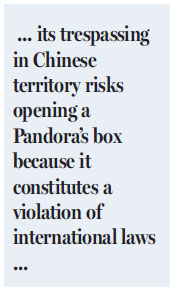India's trespassing justifications invalid
Calling Donglang a disputed area in spite of the consensus between China and Bhutan makes no sense at all, and India doing so does not justify the trespassing of its troops in the area. Apparently some Indian hardliners think creating the border dispute will help secure the "chicken's neck", the narrow corridor linking the Indian mainland to its northeastern states, as well as its regional dominance.
From the historical perspective, the 1890 Convention between Great Britain and China Relating to Sikkim and Tibet clearly delimited this part of the boundary between the Tibet autonomous region and India's Sikkim State, which remained an independent kingdom until 1975. Back in the 17th century when Bhutan and Sikkim were founded, both kingdoms maintained close political, economic and cultural ties with China's Tibet. The trilateral borders were also well established and acknowledged.

In 1794 China and Sikkim demarcated their border and kept it that way before the Convention between Great Britain and China Relating to Sikkim and Tibet was signed. After invading Bhutan, Sikkim and China's Tibet region, the British Empire forced the government of China's Qing Dynasty (1644-1911) to accept the British control over Sikkim and made Mount Gipmochi the "tri-junction" between China, Sikkim and Bhutan. The "revised" China-Sikkim border did demarcate certain Chinese territories on the Sikkim side, but Donglang was never one of them.















